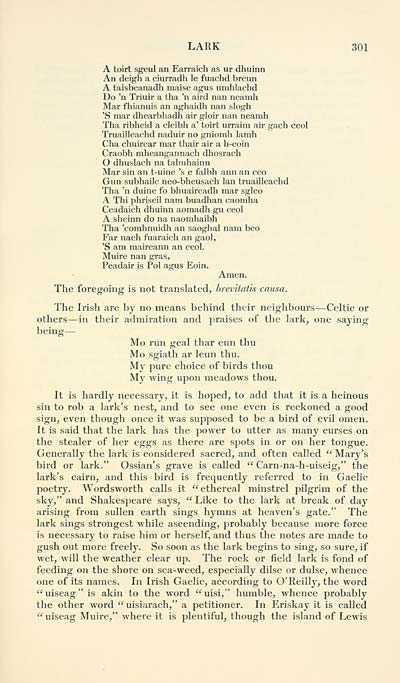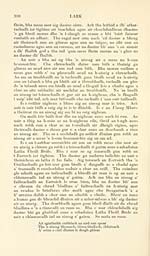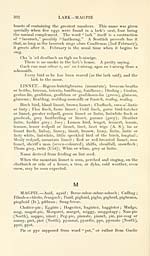Download files
Complete book:
Individual page:
Thumbnail gallery: Grid view | List view

LARK 301
A toirt sgeul an Earraich as ur dhiiinn
An deigh a ciiirradh le fuachd breun
A taisbeanadh maise agus iimhlachd
Do 'n Triuir a tha 'n aird nan neamh
Mar fhianuis an aghaidh nan slogh
'S mar dhearbhadh air gloir nan neamh
Tha ribheid a cleibh a' toirt urraim air gach ceol
Truailleachd naduir no gniomh lamh
Cha chuirear mar thair air a h-eoin
Craobh raheangannach dhosrach
O dhuslach na tahiihainn
Mar sin an t-uine 's e falbh ann an ceo
Gun subhailc neo-bheusach Ian truailleachd
Tha 'n duine fo bhuaireadh mar sgleo
A Thi phriseil nam buadhan caomha
Ceadaich dhuinn aomadh gu ceol
A sheinn do na naomhaibh
Tha 'corahnuidh an saoghal nam beo
Far nach fuaraich an gaol,
'S am maireann an ceol.
Muire nan gras,
Peadair is Pol agus Eoin.
Amen.
The foregoing is not translated^ brevitatis causa.
The Irish are by no means behind their neighbours — Celtic or
others — in their admiration and praises of the lark, one saying
being —
Mo run geal thar eun thu
Mo sgiath ar leun thu.
My pure choice of birds thou
My wing upon meadows thou.
It is hai'dly necessary, it is hoped, to add that it is a heinous
sin to rob a lark's nest, and to see one even is reckoned a good
sign, even though once it was supposed to be a bird of evil omen.
It is said that the lark has the power to utter as many curses on
the stealer of her eggs as there are spots in or on her tongue.
Generally the lark is considered sacred, and often called " Mary's
bird or lark." Ossian's grave is called " Carn-na-h-uiseig," the
lark's cairn, and this bird is frequently referred to in Gaelic
poetry. Wordsworth calls it " ethei'eal minstrel pilgrim of the
sky," and Shakespeare says, " Like to the lark at break of day
arising from sullen earth sings hymns at heaven's gate." The
lark sings strongest while ascending, probably because more force
is necessary to raise him or herself, and thus the notes are made to
gush out more freely. So soon as the lark begins to sing, so sure, if
wet, will the weather clear up. The rock or field lark is fond of
feeding on the shore on sea-weed, especially dilse or dulse, whence
one of its names. In Irish Gaelic, according to O'Reilly, the word
"uiseag"is akin to the word "uisi," humble, whence probably
the other word '^ uisiarach," a petitioner. In Eriskay it is called
"uiseag Muire," where it is plentiful, though the island of Lewis
A toirt sgeul an Earraich as ur dhiiinn
An deigh a ciiirradh le fuachd breun
A taisbeanadh maise agus iimhlachd
Do 'n Triuir a tha 'n aird nan neamh
Mar fhianuis an aghaidh nan slogh
'S mar dhearbhadh air gloir nan neamh
Tha ribheid a cleibh a' toirt urraim air gach ceol
Truailleachd naduir no gniomh lamh
Cha chuirear mar thair air a h-eoin
Craobh raheangannach dhosrach
O dhuslach na tahiihainn
Mar sin an t-uine 's e falbh ann an ceo
Gun subhailc neo-bheusach Ian truailleachd
Tha 'n duine fo bhuaireadh mar sgleo
A Thi phriseil nam buadhan caomha
Ceadaich dhuinn aomadh gu ceol
A sheinn do na naomhaibh
Tha 'corahnuidh an saoghal nam beo
Far nach fuaraich an gaol,
'S am maireann an ceol.
Muire nan gras,
Peadair is Pol agus Eoin.
Amen.
The foregoing is not translated^ brevitatis causa.
The Irish are by no means behind their neighbours — Celtic or
others — in their admiration and praises of the lark, one saying
being —
Mo run geal thar eun thu
Mo sgiath ar leun thu.
My pure choice of birds thou
My wing upon meadows thou.
It is hai'dly necessary, it is hoped, to add that it is a heinous
sin to rob a lark's nest, and to see one even is reckoned a good
sign, even though once it was supposed to be a bird of evil omen.
It is said that the lark has the power to utter as many curses on
the stealer of her eggs as there are spots in or on her tongue.
Generally the lark is considered sacred, and often called " Mary's
bird or lark." Ossian's grave is called " Carn-na-h-uiseig," the
lark's cairn, and this bird is frequently referred to in Gaelic
poetry. Wordsworth calls it " ethei'eal minstrel pilgrim of the
sky," and Shakespeare says, " Like to the lark at break of day
arising from sullen earth sings hymns at heaven's gate." The
lark sings strongest while ascending, probably because more force
is necessary to raise him or herself, and thus the notes are made to
gush out more freely. So soon as the lark begins to sing, so sure, if
wet, will the weather clear up. The rock or field lark is fond of
feeding on the shore on sea-weed, especially dilse or dulse, whence
one of its names. In Irish Gaelic, according to O'Reilly, the word
"uiseag"is akin to the word "uisi," humble, whence probably
the other word '^ uisiarach," a petitioner. In Eriskay it is called
"uiseag Muire," where it is plentiful, though the island of Lewis
Set display mode to: Large image | Transcription
Images and transcriptions on this page, including medium image downloads, may be used under the Creative Commons Attribution 4.0 International Licence unless otherwise stated. ![]()
| Early Gaelic Book Collections > Blair Collection > Gaelic names of beasts (mammalia), birds, fishes, insects, reptiles, etc > (327) |
|---|
| Permanent URL | https://digital.nls.uk/79333171 |
|---|
| Description | A selection of books from a collection of more than 500 titles, mostly on religious and literary topics. Also includes some material dealing with other Celtic languages and societies. Collection created towards the end of the 19th century by Lady Evelyn Stewart Murray. |
|---|
| Description | Selected items from five 'Special and Named Printed Collections'. Includes books in Gaelic and other Celtic languages, works about the Gaels, their languages, literature, culture and history. |
|---|

